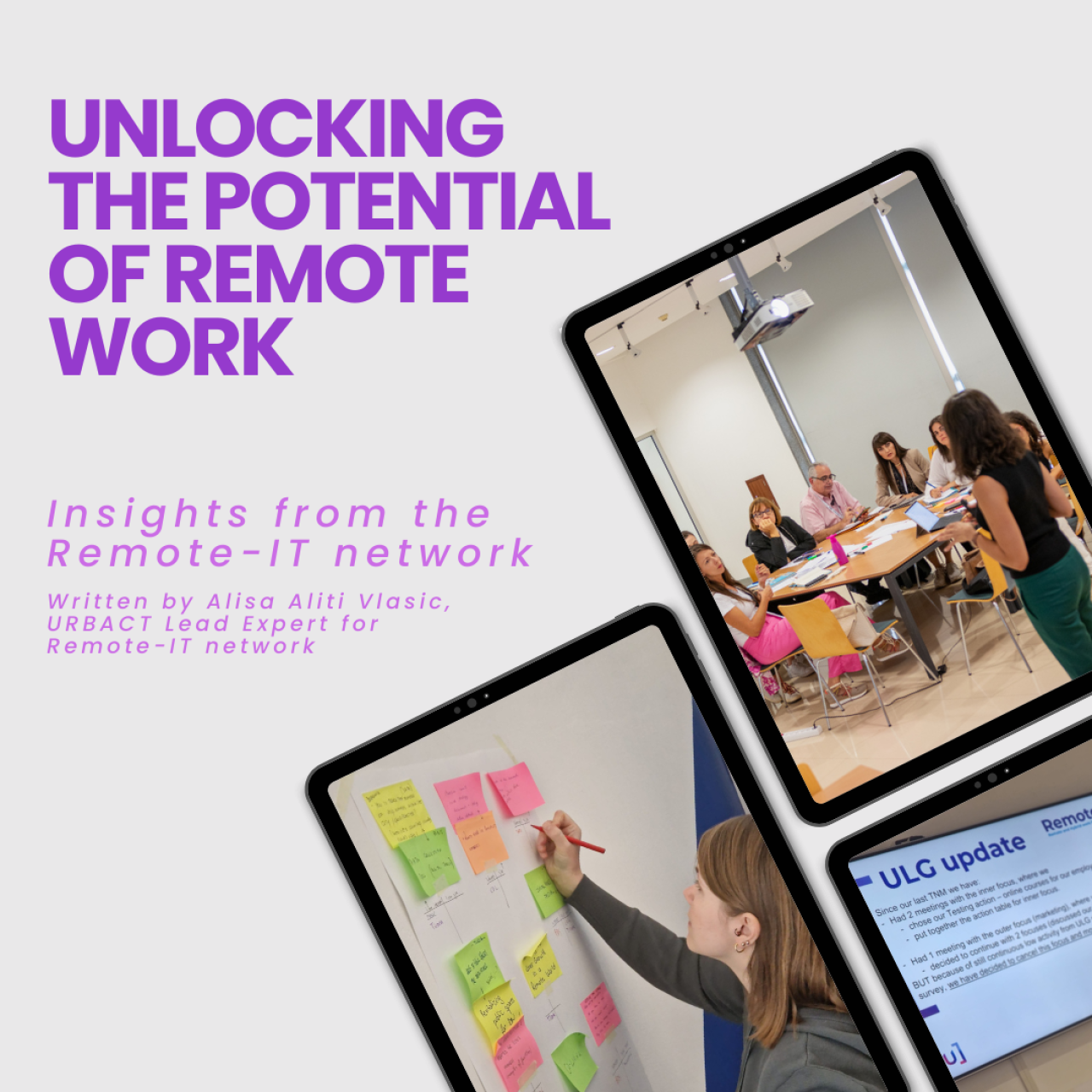Remote work as an urban development strategy
Remote work is no longer an exception but a defining feature of the modern workforce. Cities must understand its long-term implications to remain competitive. The acceleration of digitalization, together with changing workforce expectations, has pushed remote work beyond a temporary pandemic-driven solution into a sustainable model that influences urban economies.
From a policy perspective, cities could consider two aspects of remote work:
Attracting external talent—digital nomads and remote workers who choose a city based on quality of life, infrastructure, and local ecosystems.
- Integrating remote work within public administration—ensuring that municipal employees can work remotely without compromising service delivery, efficiency, or inclusivity.
Beyond workforce trends, remote work also has spatial and environmental implications. With fewer people commuting daily, urban planners have an opportunity to rethink zoning plans, repurpose office spaces, and invest in mixed-use developments that foster vibrant local economies. Moreover, digital infrastructure policies play a critical role in ensuring that remote work contributes to economic resilience goals.
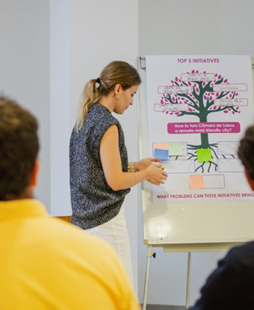
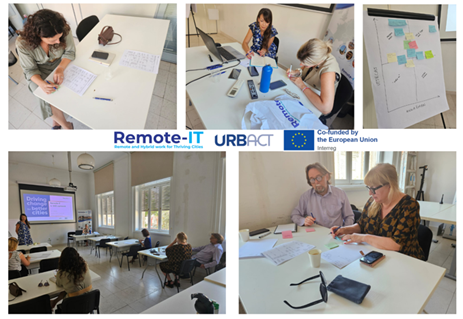
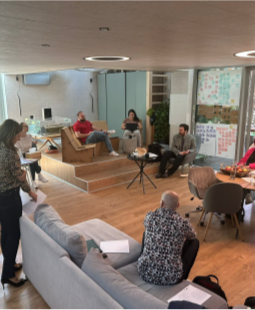
Understanding the needs of remote workers and digital nomads
Attracting remote professionals requires more than offering coworking spaces and fast internet. The first Remote-IT Online Forum, “Green Transition and Remote Work,” brought together urban policy experts and researchers to discuss how remote work contributes to environmental sustainability, regional development, and labour market evolution.
One of the key takeaways was that cities must actively shape their approach to remote work rather than simply responding to trends. This means aligning strategies with broader goals, such as sustainability, local economic diversification, and social inclusion. Several key questions emerged:
How can remote work policies be designed to maximize environmental benefits while minimizing unintended negative impacts?
What are the key environmental trade-offs of remote work, and how can data-driven research help policymakers create strategies that contribute to sustainability goals?
Does remote work truly support the green transition, or do hidden variables and contextual factors complicate its environmental impact?
To explore these questions further and hear insights from experts who joined the discussion, check out the full video of the Remote-IT Online Forum, ‘Green Transition and Remote Work’.
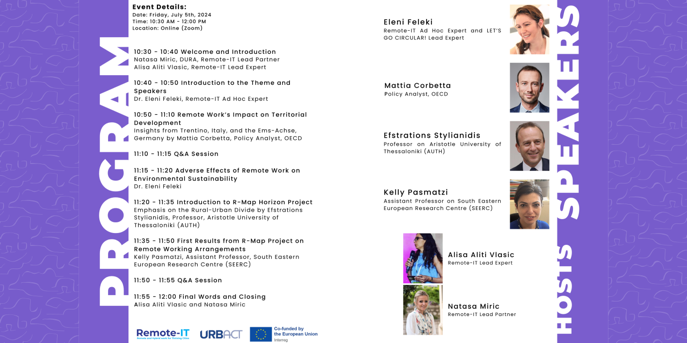
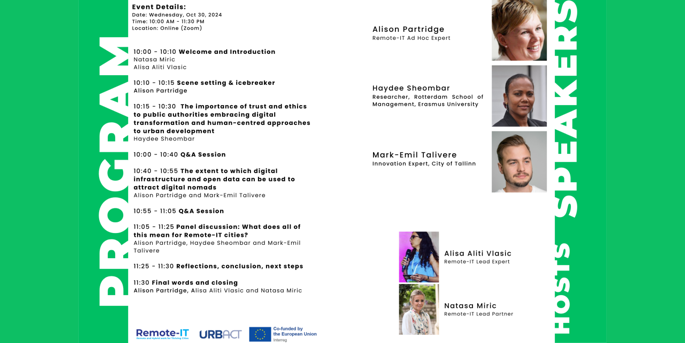
The second online forum, “Beyond Lifestyle: Digital Transformation, Nomads, and Remote Workers,” further expanded on these issues, emphasizing that remote work is not just a lifestyle choice—it is a fundamental economic shift that requires cities to rethink service delivery, talent retention, and digital transformation.
A major discussion point was ecosystem building—attracting remote workers requires more than just infrastructure. Cities should foster an innovation-friendly environment by integrating networking opportunities, co-creation spaces, and support services that enable remote professionals to succeed. Another key issue was the paradox of digital trust—while individuals openly share data with private companies, scepticism toward government digital services remains high. This trust gap presents a significant challenge for cities seeking to integrate remote work into public administration, requiring transparent governance, strong cybersecurity measures, and clear communication strategies to build confidence.
The video of the second Remote-IT Online Forum, ‘Beyond Lifestyle: Digital Transformation, Nomads, and Remote Workers’ can be found here.
Testing remote work initiatives
As network cities, together with their URBACT local groups, progressed in defining their Integrated action plans, new questions and uncertainties emerged about whether they were heading in the right direction. To address this, some of the planned large-scale initiatives will first be tested through pilot actions.
Throughout 2024, the network has been actively sharing and gathering knowledge through transnational meetings (TNMs) held in Murcia, Tartu, Câmara de Lobos, and Brindisi. These meetings have been complemented by Living Library sessions, which allow for deep dives into specific aspects of remote and hybrid work, as well as site visits where host cities showcase local experiences and lessons learned.
Each partner city (in alphabetical order) has developed testing actions to explore and refine solutions for attracting remote workers and/or enhancing internal hybrid work models:
Bucharest District 6 will test a thematic meet-up for digital nomads and remote workers, fostering community building and skill-sharing, alongside the creation of a promotional video to highlight Sector 6’s remote work ecosystem and address identified challenges.
Brindisi will test a one-month all-inclusive service package for digital nomads, providing accommodation, workspaces, networking, bureaucratic support, and local activities to evaluate the city’s potential as a hub for digital nomads, its service quality, and the specific needs of remote workers.
Câmara de Lobos launched the Innovator in Residence Programme 2024 to test whether short-term residencies could attract high-skilled international talent, foster collaboration with local stakeholders, and incubate innovative projects addressing urban challenges.
Dubrovnik is testing the setup of a new coworking space at the TUP hub, preparing the space, launching a user survey to assess its impact, and coordinating a targeted marketing campaign to attract digital nomads.
Heraklion tested two initiatives to attract digital nomads: developing a dedicated website to provide key information and services, and transforming a municipal space into a digital nomad-friendly working hub by installing a soundproof workstation at the Heraklion Youth Centre.
Murcia completed a month long pilot tests of hybrid work models within different municipal departments, alongside a campaign at Murcia's Science, Technology and Innovation Week to promote Digital Nomad captivation initiative for Audiovisual Hub.
Tartu is developing online courses on remote work (including virtual and hybrid meetings), testing their effectiveness for skill development, evaluating the suitability of the SharePoint platform for e-learning, and gathering input for a remote work training plan.
Tirana organized the Tirana Digital Nomad Festival to further assess its potential for attracting remote workers, fostering collaboration, and supporting the local digital nomad ecosystem, with plans to integrate it into the city's long-term strategy.
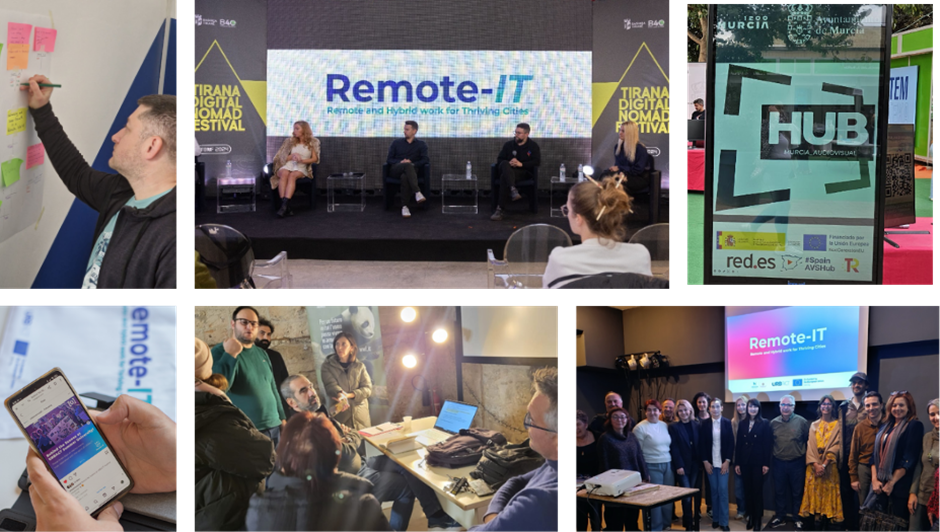
The role of municipal governments in hybrid work
One of the less explored but highly relevant topics within the Remote-IT network was the question of how local governments themselves adapt to remote work. While the private sector has largely embraced hybrid models, many city administrations remain structured around traditional, office-based workflows.
Through discussions within the network, several key concerns emerged:
Ensuring cybersecurity and data protection in municipal operations.
Balancing remote work flexibility with the need for public service accessibility.
Developing management skills for hybrid teams in public administration.
Two successful examples came from Murcia and Tartu’s municipal government, where internal exploration is helping them identify department-specific challenges and opportunities in adopting hybrid work. Rather than implementing a one-size-fits-all approach, they are exploring on how to tailor their policies to the needs of different administrative units.
Building a framework for the future: recommendations for cities
Based on the experiences from the 2024 work of the Remote-IT Network, several recommendations emerge for cities looking to integrate remote work into their economic and governance models:
Invest in both digital and social infrastructure—high-speed internet and coworking spaces are essential, but so are community-building efforts, cultural programs, and networking opportunities.
Adopt a testing approach before scaling solutions—small testing initiatives can help cities refine their strategies before committing to large-scale investments.
Foster public-private partnerships—engaging businesses, universities, and local communities in the design and implementation of remote work policies ensures better alignment with real-world needs.
Leverage branding and strategic positioning—remote workers and digital nomads are drawn to cities that offer a strong identity, affordability, and quality of life.
Develop clear policies for hybrid work within public administration—including guidelines for cybersecurity, productivity tracking, and employee well-being.
Check also:
REMOTE-IT Podcast: Our Changing Work Places: What Do We Need for Remote Working?
REMOTE-IT Podcast: Who is a remote worker/digital nomad these days?
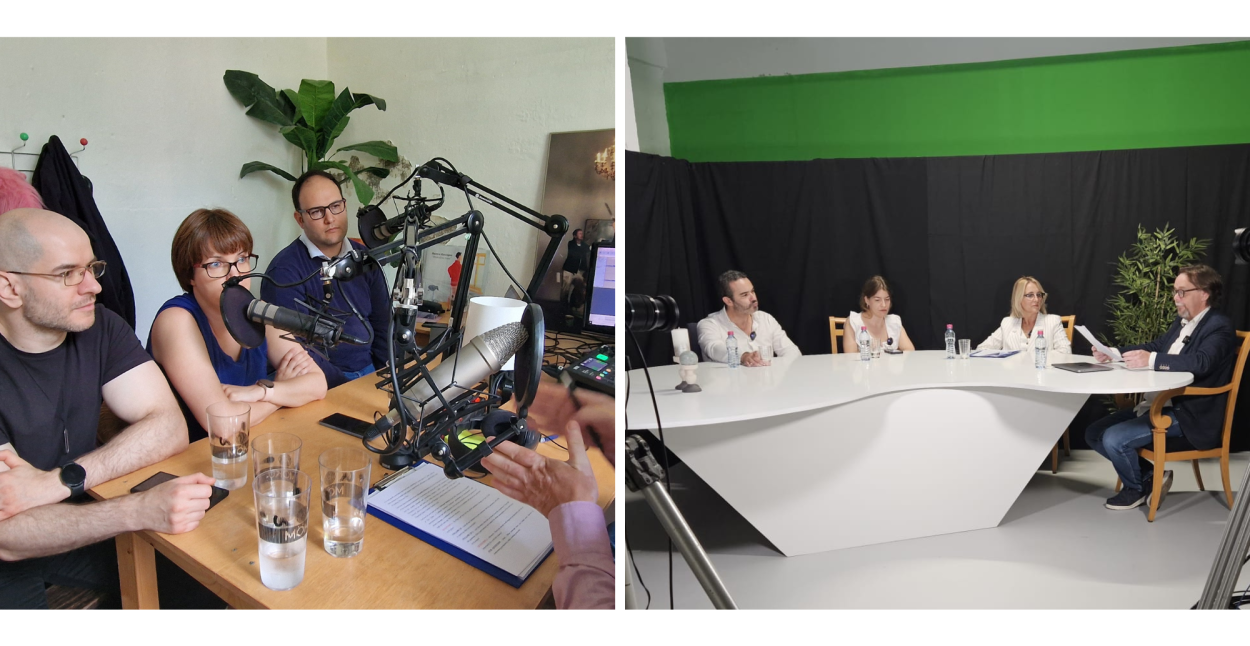
Article written by Alisa Aliti Vlasic, URBACT Lead Expert for Remote-IT network

